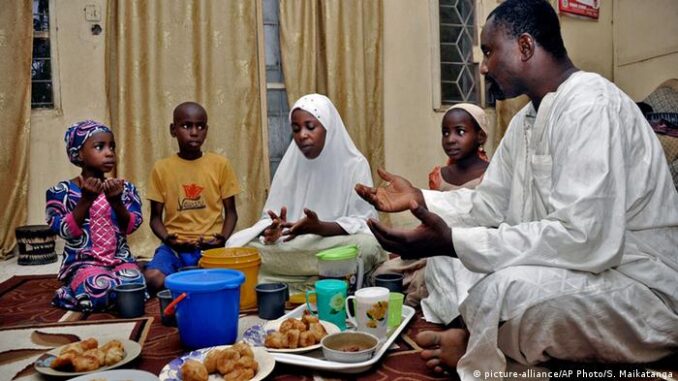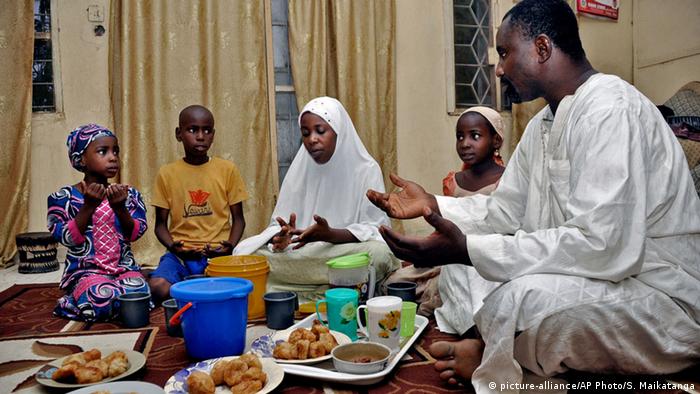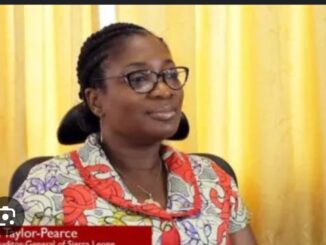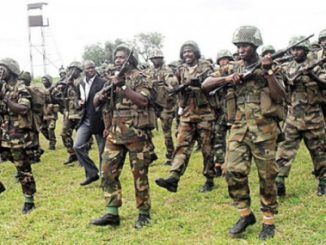
Kids of today did not enjoy like us . We met the good times . We enjoyed Ramadan and Christmas .
We did not enjoy any moment like the yearly Muslim months of fasting . My parents started as Muslims but converted to Christianity in their twilight years. But when they were Muslims , we enjoyed Ramadan .
As gluttonous kids growing up, we loved and enjoyed food , never do much as during these religious occasions , which we loved special because of the abundance and variety of foods .
When my parents had broken their day of fasting, we will line up the variety of foods they had to eat that evening on a huge mat where they had just prayed, and oh golly, I am really using the literal meaning of the word variety . There were all kinds of food . Rice , stewed chickens, boiled groundnuts, cassava leaves and potato leaves soup, palm oil stew, potato and cassava porridge which we Lokkos call KITONE , Pap , ovaltine beverage, buttered bread etc. etc.
Our parents would have all these foods prepared for them to use to break fast but who said they will be able to eat them ? They could not consume even half of these foods and would then call on the kids to come and finish them. Feast open, ya. Though we were not compelled to fast and had eaten our regular share of food during the day , we would swoop on those foods like hungry wolves. They called the evening meal eaten to break fast SUNAKATI . Boy, did we love and enjoy SUNAKATI .
In those days, neighborliness was the vogue. As a gesture of love and solidarity , neighbors , even those who were not Muslims, provided SUNAKATI for fasting neighbors. That outlined the religious tolerance for which Sierra Leone is internationally famous. As kids, we had “awujohs “ every evening . We used to suffer from cholic stomachs due to overeating .
But that was not all. Before they started fasting in the morning, they provided a lot too to eat. This was called the SOKOLI . By then we would have woken up and bathed to go to school . Again , we will eat like wolves. So, the reason kids from Muslim homes did not patronize break and lunch food stalls in school during Ramadan was not only because they were fasting. Some, like us from liberal homes where fasting was not mandatory for kids, because our parents respected our choices ( We either were catholic school students or disinterested in Islam ) had had too much to eat before coming to school and were also looking forward to the evening feasts.
Another most anticipated moment for us as kids was the day they celebrated the end of the fasting , usually a public holiday. Muslims had two main holidays- EID -UL – AHDA and EID – UL – FITRI .
As kids, we also ate a lot on those days after enjoying the lantern parades overnight. Families and neighbors cooked and shared foods . On a given holiday, there will be all varieties of the Sierra Leonean delicacies and foods in one go on the family table—-cassava and potato leaves soup, palm nut soup,pumpkin stew, peanut soup, Tola, okra soup , krain krsin , sorkortor Yorkortor etc. You name it.
Family members and friends come visiting to eat and we too reciprocated. It was those days when Sierra Leoneans lived in unity and love. Who cared about tribe or region or APC/ SLPP Politics which have consumed everybody today and caused serious divisions ? As Camara Laye would love to say, Oh how happy we were in those days !!!
When Ramadan ended, we kids would be very sad because we missed the daily feasts of variety of foods. We were kids . It did not dawn on us that Muslims were using these religious occasions to express and cement their love for and attachment to God. As kids, all that mattered to us were our stomachs . We thought more about food than anything else. As we grew up, we gradually learnt about religion and the meaning of fasting . Muslims should therefore forgive us , when as kids, what we enjoyed most during their religious rituals was the food.
KABS KANU




